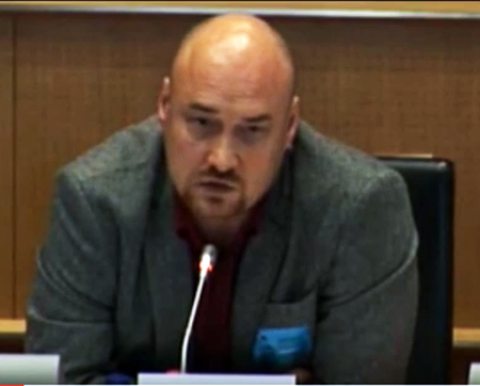Valiantsin Stefanovich: “We all know what elections in Belarus come to”
The European Parliament’s Committee on Foreign Affairs held yesterday a hearing on the situation in Belarus, which was attended by Gunnar Wiegand, European External Action Service (EEAS) Director for Russia, Eastern Partnership, Central Asia, Regional Cooperation and OSCE, and Miklós Haraszti, UN Special Rapporteur on the situation of human rights in Belarus. Valiantsin Stefanovich, deputy chairman of the Human Rights Center "Viasna", highlighted in his speech a number of issues, focusing on the presidential election scheduled for October 11.
In particular, the human rights defender commented on President Aliaksandr Lukashenka’s refusal to participate in televised debates:
“There are no dissenting opinions in TV, and this is especially evident during the election campaign. Lukashenka sees no point in the debate, as you can see him on TV every day, with highlights of his work as head of state. In this connection, he does not need to exert much effort for any election campaigning, or participating in the debate.”
Valiantsin Stefanovich also spoke about the overall assessment of the electoral process, citing the position of head of the Central Election Commission, Lidziya Yarmoshyna:
“With regard to the assessment of the election, I agree with the fact that in a situation where there is no public policy as such, it is very difficult to talk about elections as a real system of changing the authorities and the possibility of citizens to elect these authorities. It is similar to the procedures of the Soviet era: if there is an administrative procedure, people participate in it...
As recently stated by the head of the Central Election Commission Lidziya Yarmoshyna, it is not the result of the election but voter turnout that is important for her. The voters’ active participation and the turnout are more important for her than the result itself. Well, as for the result we already know it, we know what the result of elections. The CEC head said a curious thing about the subject, that the elections in Belarus are like life, and we all know what its end looks like. So we all know what the elections in Belarus come to. I can’t but agree with her.”
The Special Rapporteur Miklós Haraszti spoke on the recent release of political prisoners in Belarus, emphasizing a relative political liberalization in the country.
“We have repeatedly witnessed this soap opera – the release of political prisoners before the elections. So I would advise to be in no hurry with a major step toward Minsk at least until the elections, in which President Aliaksandr Lukashenka will become his own successor. We know the outcome of these elections, we know it as a result of unchanged laws, the unchanged human rights situation, in particular, the unchanged situation with electoral rights. Such elections by definition cannot be free and fair. And they have never been free and fair since President Lukashenka came to power,” said Miklós Haraszti.


